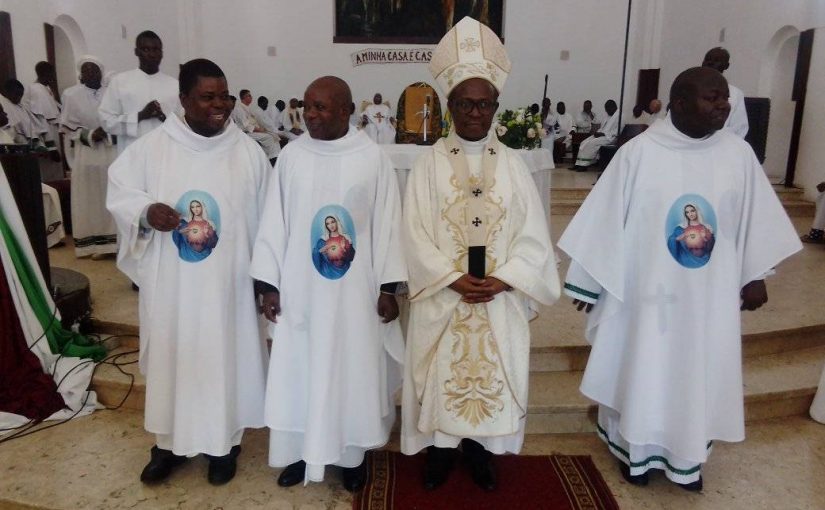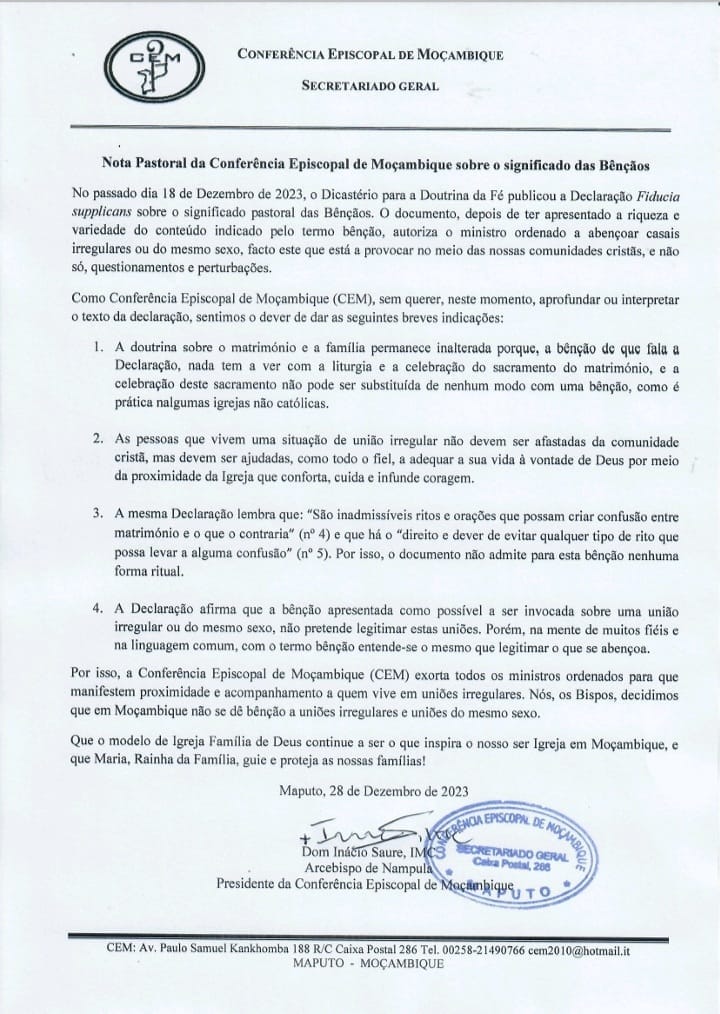Most African countries will not reach SDG child mortality goal
Mozambique: Catholic bishops reject Pope’s stance on blessings for couples in irregular situations and same-sex couples

FILE - For illustration purposes only. Archbishop Inácio Saúre of Nampula Archdiocese, President of the Episcopal Conference of Mozambique (CEM) signs the 'Pastoral Note of the Episcopal Conference of Mozambique on the Meaning of Blessings' . [File photo: Sé Catedral de Nampula/Facebook]
Mozambique’s Roman Catholic bishops announced on Thursday that they have decided that “no blessing should be given to ‘irregular unions and same-sex unions” despite the Vatican having recently authorised such blessings as long as they are not in contexts related to civil unions or weddings.
“We, the Bishops, have decided that in Mozambique no blessing should be given to irregular unions and same-sex unions,” reads a statement released by the Episcopal Conference of Mozambique (CEM). “May the model of the Church Family of God continue to inspire our being Church in Mozambique, and may Mary, Queen of the Family, guide and protect our families,” it reads.
The #Catholic Bishop in #Mozambique reject the #Vatican‘s Declaration “Fiducia supplicans”. They declare: “We, the Bishops, decide that in Mozambique there will be no blessing of irregular unions and and same-sex unions” https://t.co/BuvZoCmhPO
— Eric Morier-Genoud (@emorier) December 28, 2023
On 18 December, the Vatican officially authorised the blessings of “couples in irregular situations [including unmarried couples or divorcees] and of couples of the same sex”,while maintaining its opposition to same-sex marriage.
READ: Vatican approves blessings for same-sex couples in landmark ruling
This is the first time that the Church has made a clear statement on the blessing of same-sex couples, an issue that has generated tensions within the institution due to strong opposition from the conservative sector, in the US and elsewhere.
This blessing “should never be imparted in concurrence with the ceremonies of a civil union, and not even in connection with them,” stated the Dicastery for the Doctrine of the Faith, an organ of the Holy See, in a document approved by Pope Francis, in its ‘Declaration Fiducia Supplicans – On the Pastoral Meaning of Blessings’.
In its own statement, the CEM says on this doctrinal declaration that the Declaration “Fiducia supplicans”, “after having presented the richness and variety of the content indicated by the term blessing, authorises the ordained minister to bless irregular couples or couples of the same-sex , a fact that is causing questions and disturbances in the midst of our Christian communities and beyond”.
“The doctrine on marriage and the family remains unchanged because the blessing spoken of in the Declaration has nothing to do with the liturgy and celebration of the sacrament of marriage, and the celebration of this sacrament cannot be replaced in any way with a blessing, as is the practice in some non-Catholic churches,” the CEM’ statement continues.
READ: Some Catholic bishops reject Pope’s stance on blessings for same-sex couples. Others are confused
The Mozambican bishops nonetheless argue that people living in “irregular unions should not be removed from the Christian community, but should be helped, like all the faithful, to adapt their lives to God’s will through the closeness of the Church, which comforts, cares for and instils courage”.
“The [Vatican’s] Declaration affirms that the blessing presented as possible to be invoked over an irregular or same-sex union does not intend to legitimise these unions,” the CEM statement goes on. “However, in the minds of many of the faithful and in common language, the term blessing is understood as legitimising what is blessed. For this reason, the CEM urges all ordained ministers to show closeness and accompaniment to those living in irregular unions.”
Despite the Holy See’s earlier refusal to recognise the blessing of same-sex couples, this was already practised by some priests, notably in Belgium and Germany.
The Declaration Fiducia Supplicans – On the pastoral meaning of blessings was issued by the Dicastery for the Doctrine of the Faith and approved by Pope Francis six weeks after the end of the general assembly of the Synod for the Future of the Catholic Church, a worldwide consultative meeting during which bishops, women and laypeople debated societal issues such as the reception of LGBT+ people and the marriage of divorcees.
In early October, five conservative cardinals publicly asked Pope Francis to reaffirm Catholic doctrine on same-sex couples, but the final document of the Synod left this issue aside.
In 2021, the Vatican had reaffirmed that it considered homosexuality “a sin” and confirmed the impossibility of same-sex couples receiving holy matrimony.
Since his election in 2013, Francis has insisted on the importance of a Church that is “open to all” and has implemented various measures that have aroused the ire of conservatives.














Leave a Reply
Be the First to Comment!
You must be logged in to post a comment.
You must be logged in to post a comment.